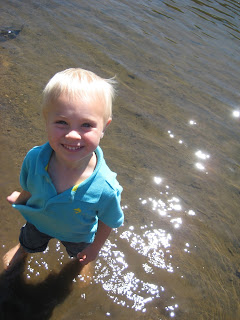It’s the evening of Isaac’s third birthday and I just can’t
believe it. I want my sweet boy to stay
just like he is forever. Some things I
want to remember about his third year of life…
He calls me “fweety mama” when I call him my sweet boy.
He says his name “Igit.”
He can work very hard and come up with an “Issssssuhc” every once in
awhile and he is so proud when he does.
He loves to organize small things and line them up. He likes to move his lines of things to other
places in the house one thing at a time.
He vrooooms trucks on the floor to get them where he wants
them, and walks/crawls all bent over even if he’s going from one end of the
house to the other.
He has a hard time pronouncing the “S” sound, and sometimes
it sounds like a Sean Connery slobbery “S”, and sometimes he exhales through
his nose instead. So instead of “snake,”
he says “(nose exhale)nake.”
He says “ever guys” for “everybody.”
He says “I think we better should.”
He says “you know, like” as if he was a 16 year-old valley
girl. I have no idea where he got
this.
He started his third year sleeping in our bed at night, and
he would often fall asleep with his hands on my cheeks, one on either side.
He then started sleeping in his own bed next to ours, and he
would often throw a leg over me in the middle of the night just to make sure I
was still there.
He now sleeps in his own bed in Eden’s room and only
occasionally needs to hold my finger as he falls asleep. If he had things his way, he would have ended
his third year still sleeping in bed with us, but he has adapted to our changes
and done really well with them.
He likes to give a kiss, then a big strong hug, and then do “noses,”
which means rubbing his nose on mine. He
came up with this 3 part routine and especially the noses himself.
He gets completely absorbed in his play and is content to
play by himself for large amounts of time.
He also LOVES playing with Eden and does not want her to go
inside when they are playing outside together.
He loves to make Eden laugh and will do something repeatedly
forever if it makes her laugh.
His favorite color is orange.
His favorite TV show is “the one where Curioush George knocks down all the ‘tuff.”
His most requested books are Everyone Poops and Millions of
Cats. Probably not coincidentally, one of
his favorite words this year was “poop”, and “poopy gaga”, and anything else
relating to the potty.
He loves to color and paint.
He chooses one color of paint and covers the entire paper in that color. He often does the same thing with
crayons. He is a monochromatic artist.
He loves bugs. He
will find anything crawling near him and examine it (mostly) gently. He once carried a small worm in his curled up
fist all through a grocery shopping trip.
He dropped it once, told me, and I found it on the floor. I put it back in his hand and we kept
shopping.
He can count to 11 in perpetuity: 1, 2, 3, 4, 5, 6, 7, 8, 9, 10, 11, 8, 9, 10,
11, 8, 9, 10, 11…
He knows bits and pieces of the ABCs, but they’re jumbled
and he skips a lot. He won’t let me help
him learn them and says “I can do it, I can do it!” if I try to help.
He started his third year saying “I can’t sing” and now he
sings sometimes, so I let him sing the ABCs wrong as much as he wants.
He believes in go big or go home. For Christmas he asked for "a HOOOOOOOGE sucker," and for his 3rd birthday he asked for "all the legos."
He has to finish his process. If he is in the middle of a game or activity
or job that he’s doing, he. must. finish. before we leave the house or change
his diaper or go eat dinner. He will
express very clearly just how upset he is to not be able to finish if I
interrupt him through screaming and flailing and limp-bodying. I’m learning to build in “finishing time” to
our transitions.
He is sensitive to my tone.
He thinks my serious voice is mean and says in his best mean voice, “Mama,
you talking MEAN at me.”
He has a soft heart.
He can be rough and aggressive sometimes, but his heart is tender and he
needs connection and gentleness even in the midst of correction.
He lost his toddler belly this year. I was watching him play in the sand one day
and saw him stand up, up, up…no belly.
He’s all stretched out now.
His favorite snuggle spot is on my left shoulder, head facing out, arms down at his sides or one arm curled around my neck. He likes me to walk around holding him like this when he needs a snuggle.
His hair is wispy light blond, and before his haircut he
looked like a dandelion gone to seed.
We have a rhyme that is just his and mine, and during his
third year he started changing his part of the rhyme to “poopy gaga.” But tonight he said his words just right,
hugged me tight, and said “I love you fweety fwee-year-old Mama” when I said “I
love you my sweet three-year-old Isaac.”
Isaac,
Mama’s love for you is big
And it’s
strong
And it’s
true.
Mama’s love for you will last
Your
whole life through.
Love you sweet boy,
Mama




































